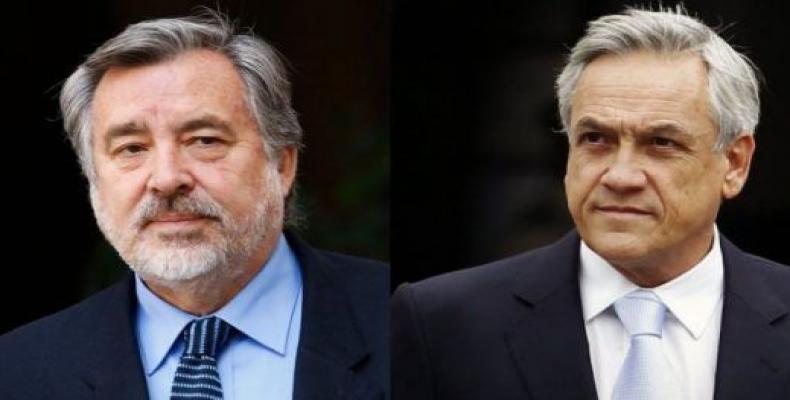Santiago de Chile, November 20 (RHC)-- With the majority of votes accounted for in Chile's presidential election, conservative billionaire Sebastian Piñera will head to the second round with 36.65 percent where he will face with Alejandro Guillier of the center-left New Majority coalition, who finished with 22.59 percent.
Beatriz Sanchez of the Broad Front coalition trails in a close third with 20.40 percent of the total vote, well above the poll numbers predicted for the new Left candidate.
Far-right candidate Jose Antonio Kast trails with 7.9 percent, ahead of Carolina Goic of Christian Democrat party with 5.94 percent and Progressive Party candidate Marco Enriquez-Ominami with 5.55 percent. Leftist's Alejandro Navarro and Eduardo Artes each obtained around half a percentage point.
Over 13 million Chileans were eligible to vote for eight presidential candidates, along with 155 members of the lower house and half of the Senate at a total of 42,890 polls stations across the country.
Approximately 38,000 voters qualified for the early polls, while Chileans outside of the country were able to vote for the first time in the Andean country's history.
Piñera served from 2010-2014, while former journalist Guillier from Bachelet's ruling coalition was considered to be Pinera's most formidable competition, according to analysts.
Earlier, a group of protesters rallied outside Pinera's campaign headquarters, shouting that the candidate "is the symbol of corruption" and "has turned his back on the Chileans."
A Piñera victory will add Chile to the list of South America countries with conservative leaders, following Argentina, Brazil, and Peru.
Since repealing mandatory voting, turnout in recent Chilean elections has been abysmally low, with only 43 percent participating in the 2013 general elections and a lowly 13 percent going to polls for the recent primaries. Bachelet won the 2013 elections with 63 percent of the votes.
The government has attempted to address the issue, launching campaigns to engage the public and circulate messages with slogans such as “Come on, don’t get lost!.” To promote a higher voter turnout, the subway system in cities like Santiago and Valparaiso announced that they would not charge fares for those going to vote.
Chileans in 62 countries around the world also voted for these elections, ahead of the normal elections in the country, a reform promoted by President Bachelet in 2014 that allows them to vote for the first time in presidential elections from outside the national territory.
Another important changes implemented by the administration was the "quota law" which requires political parties to have at least 40 percent female candidates.
After casting her vote, Bachelet said it was important that people voted, as it is their right, "and that they vote for whoever they feel represents what they want for Chile."
"If there is a second round, which I think will be, I hope we can hear ideas, proposals and discussions about the country models that each candidate represents," she said.
Chilean Presidential Candidates to Face-Off in Runoff Elections

Related Articles
Commentaries
MAKE A COMMENT
All fields requiredMore Views
- Cuban delegation calls on rich countries at ECLAC to fulfill development aid
- New York doctor fired for rejecting Zionist propaganda, defending resistance
- Cubans to take part in Panamerican Junior Judo Cup
- Russian minister says BRICS to establish digital payment system for members
- Ibero-American Criminal Sciences event comes to a close in Cuba

